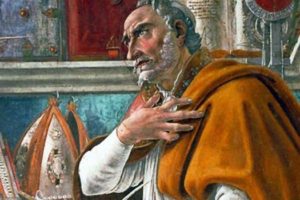Augustine of Hippo
Why is the greatest saint of the ancient world the patron of brewers?
Aurelius Augustinus was born in present-day Algeria in 354, when the region was one of the most prosperous in a revitalized, Christian Roman Empire. His mother Monica was a Christian but his father Patricius, a respectable civil servant, was a pagan. Augustine was educated in the faith but rejected it when he went in his teens to Carthage to study rhetoric. There he indulged himself in riotous living, (thus the patronage of brewers), became a Manichaean — a follower of the popular dualist philosophy that had arrived from Persia — and took a concubine who would bear him a son. He taught rhetoric at Carthage before moving to Rome in 383. Augustine had abandoned Manichaean ideas by this time, unsatisfied with the answers they provided, and in Italy became a devotee of Platonism. In 384 he headed north to the imperial capital of Milan where he had won a coveted chair in rhetoric; there he fell under the spell of Ambrose, Bishop of Milan, a towering intellect and preacher. Influenced by Ambrose and the incessant pleadings of his mother Monica, Augustine became more interested in Christianity. His conversion was famously prompted by hearing a child-like voice speak to him in a moment of spiritual anguish. In his autobiography The Confessions, he said:
I cast myself down I know not how, under a certain fig-tree, giving full vent to my tears; and the floods of mine eyes gushed out an acceptable sacrifice to Thee. And, not indeed in these words, yet to this purpose, spake I much unto Thee: and Thou, O Lord, how long? how long, Lord, wilt Thou be angry, for ever? Remember not our former iniquities, for I felt that I was held by them. I sent up these sorrowful words: How long, how long, “tomorrow, and tomorrow?” Why not now? why not is there this hour an end to my uncleanness?
So was I speaking and weeping in the most bitter contrition of my heart, when, lo! I heard from a neighbouring house a voice, as of boy or girl, I know not, chanting, and oft repeating. ‘Take up and read; Take up and read.’ [’Tolle, lege! Tolle, lege!’] Instantly, my countenance altered, I began to think most intently whether children were wont in any kind of play to sing such words: nor could I remember ever to have heard the like. So checking the torrent of my tears, I arose; interpreting it to be no other than a command from God to open the book, and read the first chapter I should find…
Eagerly then I returned to the place where Alypius was sitting; for there had I laid the volume of the Apostle when I arose thence. I seized, opened, and in silence read that section on which my eyes first fell: ‘Not in rioting and drunkenness, not in chambering and wantonness, not in strife and envying; but put ye on the Lord Jesus Christ, and make not provision for the flesh, in concupiscence.’ [Romans 13:14-15] No further would I read; nor needed I: for instantly at the end of this sentence, by a light as it were of serenity infused into my heart, all the darkness of doubt vanished away.
After he and his son were baptized by Ambrose, he returned to Africa. He might have lived the quiet life of a prosperous provincial citizen but he reluctantly agreed to become a priest and then bishop of the city of Hippo Regius. There he dispensed justice (bishops were considered part of the Roman administrative and legal system), tended his spiritual flock, engaged in theological controversies, preached, and wrote ceaselessly. In addition to the Confessions, a landmark in the development of autobiography, he produced The City of God, which presented a Christian view of history and God’s role in it; De Libero Arbitrio, against Manichaeanism; De Baptismo contra Donatistas, against a schismatic North African sect; and De Gratiâ Christi et de peccato originali, against the Pelagian heresy. His writings on predestination, free will, millenialism, creationism, and just war have provided the backbone for Christian theology over the last 1500 years. Augustine died in 430 while Hippo was being besieged by the barbarian Vandals. His relics have been moved a number of times and now rest in Pavia, in northern Italy.
In addition to brewers, he is the patron saint of printers, theologians, spiritual seekers and those with failing eyesight.
